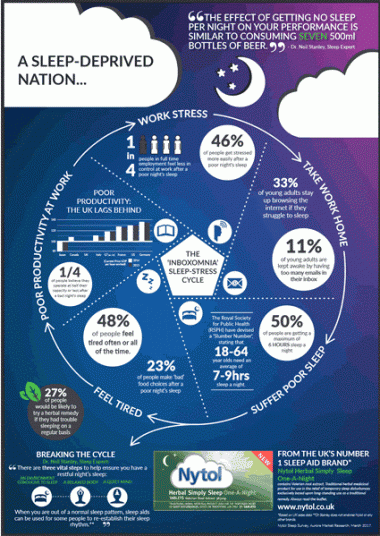Sleep-deprived and severely stressed: Is it time Britain took a Sabbath?

New research suggests that many British adults are struggling with sleep deprivation, constant tiredness and severe stress. Are they in need of a Sabbath?
The study, published yesterday, says that 40 per cent of Britons 'often feel tired', and half of those surveyed get no more than six hours sleep every night.
Recommendations by the Royal Society for Public Health (RSPH) suggest that 18-64 year olds need between 7-9 hours sleep per night. The RSPH is urging the government to address the nation's sleep deprivation, which it suggests is having a serious effect on the nation's economy and productivity.
Over a quarter of British workers believe they operate at half their capacity or less, after a poor night's sleep. Just under half get stressed more easily and one in four full-time workers finds they feel less in control when they don't sleep well.
Causes of sleep loss include excessive demands on time, unfinished to do lists and an overwhelming email inbox.
Sleep expert, Dr Neil Stanley said: 'Many people are stuck in a vicious cycle. Poor sleep habits make people less productive in the workplace and when suffering with sleepiness, they often find it harder to make critical decisions.
'We then see people taking work home with them, sometimes working late into the night. This in turn can disrupt sleep for the following night. '
The study also suggests that many spend time browsing on digital devices long into the night, often as an antidote to sleep struggles.
Dr Stanley added: 'People now commonly turn to devices as a means of distraction when they are struggling to drop off to sleep. However, this is likely to be making the situation worse. There are three vital steps to help ensure you have a restful night's sleep - an environment conducive to sleep, a relaxed body and a quiet mind. Going to bed and waking up at a regular time can also help to avoid sleep disturbances.'
Another way to rest

The study was commissioned by the sleep aid brand Nytol. While there may well be medicinal and therapeutic ways to counter pervasive tiredness, Christian thought offers a historic and completely inexpensive path to rest, found in the very first chapters of the Bible. It is of course the Sabbath.
God set a vision for healthy work when he created the world: 'By the seventh day God had finished the work he had been doing; so on the seventh day he rested from all his work. And God blessed the seventh day and made it holy, because on it he rested from all the work of creating that he had done' (Genesis 2:3).
The call to rest was built into the Israelite law code, seen in the fourth of the ten commandments. It's part of God's vision for a good life.
One might think that rest and relaxation is by definition, easy. But in a frantic, work-obsessed and now exhausted world, finding time to rest and refrain from labour is incredibly hard.
When there's always more assignments to be done, people to meet and endless buzz of 'notifications' to receive, who can make time for the luxury of rest? Therein lies the discipline. We actually have to make time. Healthy rhythms of rest don't come naturally to us – that's why we need a command, and a divine example to show the way.
The study is of course focused on sleep, not sabbath-keeping, but the principle remains: if we shirk on the discipline of rest, our lives will suffer. We're living beings, not machines.
Speaking of machines, our obsession with devices apparently isn't helping us either – the digital glare keeping us up long into the night. Another biblical principle – fasting and self-denial – might help here. We may need to force ourselves to let go of the devices we're not sure we can live without. The fast is a challenge, but it offers great freedom too, not least of all a good night's sleep.
The study implies space for peaceful rest and mediation would be beneficial. Christians of course, have the practice of prayer. While prayer isn't intended as a sleep-aid, it may well be that the essential practice of communing with God is also good for one's holistic wellbeing.
After all, we're only human.
You can follow @JosephHartropp on Twitter











